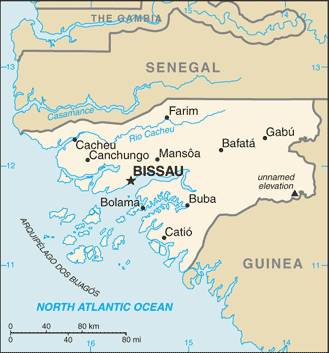Africa > Guinea-Bissau: Weather, Map, Costs and Travel Guide

Guinea-Bissau : When and where to go?
Click on a city for complete climate and weather tables
| Town | Jan | Feb | Mar | Apr | May | June | July | Aug | Sept | Oct | Nov | Dec |
| Bissau |  |  |  |  |  |  |  |  |  |  |  |  |
Guinea-Bissau: Climate & Weather
The climate of the country is tropical, hot and humid with heavy precipitation.
The year is divided into two seasons: the dry season from December to May, where the harmattan blows, and the rainy season between June and November when the wind comes from the southwest.
It is more pleasant to visit Guinea-Bissau during the dry season.
Weather today

Overcast
Wind: 6 km/h
Precipitation forecast: 0 mm
> Full report and 7-days forecast
Data updated at 23:21 (local time)
At that time, the weather was:
 24 °C / Dust
24 °C / Dust
Guinea-Bissau: Map

Sponsored links
What to do in Guinea-Bissau
On the mainland, it is mainly around the Corubal river that you will concentrate your discoveries: authentic villages, falls of Cusselinta, monkeys and birds.
You can also stroll in the capital Bissau, if the political context allows it, marked by the traces of its colonial past, and which offers a market full of animation and colors, like that of Bafata a little further east.
Guinea-Bissau: The basics
The current currency is the CFA Franc.
To get to Guinea-Bissau, the easiest solution is to take a plane ticket to Dakar and then join Bissau either with a flight from Senegal Airlines (expensive!) Or by taxi-bush to Ziguinchor And then by bus to Bissau.
To move around the country, the taxi-bush is the best solution: despite its slowness especially in the rainy season and its very dense frequentation, it is economical and above all, has no competitor, since buses are extremely rare. You will also be obliged to use ferries, and various boats to cross the multiple streams and to go to the Bijagos.
Your budget: given the lack of organized tourism, the budget to be expected is very low, up to the level of comfort proposed. You can find a double room for less than 10 €, and in the cities 30 € with a little more comfort. You can also easily sleep at home. As for the meals, you will eat for 2 € in the small local restaurants.
Health question, you have the obligation to be vaccinated against yellow fever, but it is also strongly advised to have its classic vaccinations and to add those against meningococcal meningitis, typhoid and hepatitis A and B. Also take treatment for malaria. Drink only bottled or boiled water, and wash food well.
As regards security, Bissau and its suburbs are to be avoided in view of the number of armed attacks but also because of political clashes. Also avoid the border area with Senegal. Do not move at night, especially if you are alone.
Shopping: you will have to satisfy the usual handicrafts, calabashes, weaves or musical instruments because there is no trade intended for the tourists.



